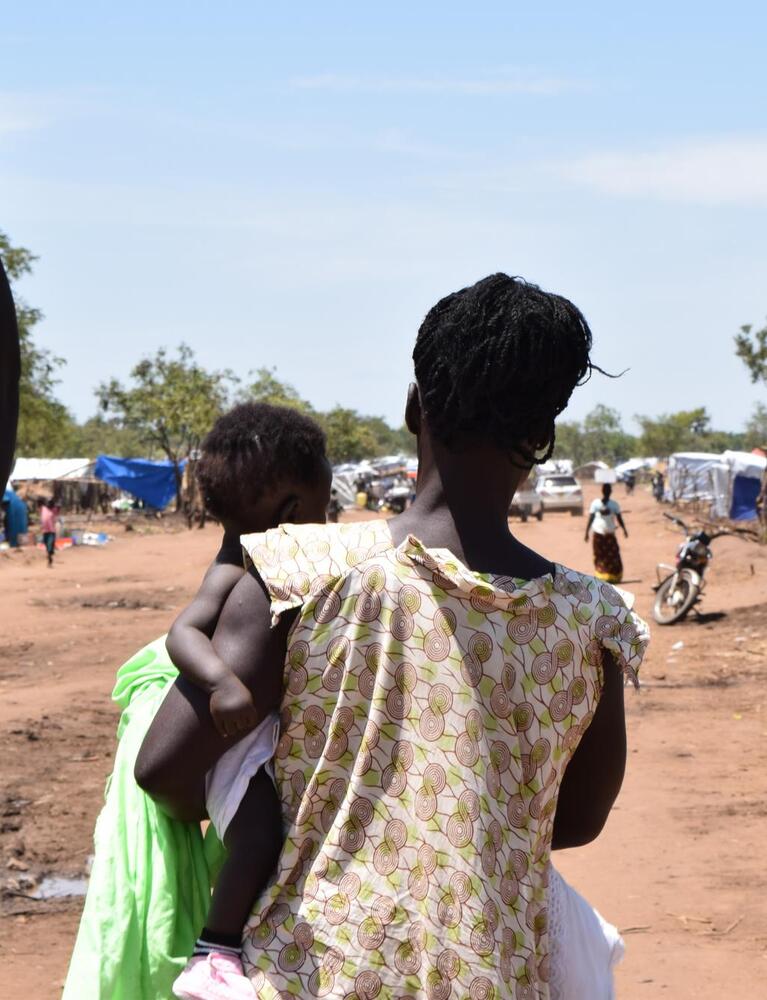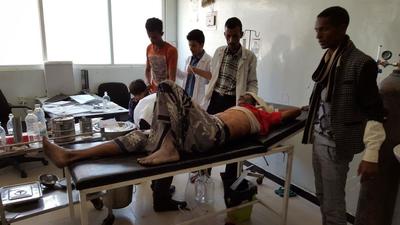“I came to Uganda because of the violence in South Sudan," says 37-year-old Rose, from Greater Equatoria Region in South Sudan, who arrived in Uganda with her five children around a month ago.
"My nextdoor neighbours were dragged from their home by men, kidnapped and chopped into pieces. Other families were taken, and I was worried we would be next.”
Rose is one of more than 172,000 people who have arrived in northern Uganda in the last three months. All are fleeing similarly traumatic experiences, or the threat of them, in South Sudan.
The Ugandan government has put aside land near the town of Yumbe to host the new refugees, but these ‘zones’, together known as Bidi Bidi Refugee Camp, have been quickly filled.
“I’d gone to the market to buy some things and sell vegetables I’d been growing. Suddenly, these men turned up and started setting everything on fire. They were stealing from stalls and attacking people.
The government is opening up more land and creating new ‘zones’, but people processing new arrivals and running services for refugees are overwhelmed. Refugees are either living with no shelter, or crowded into small shelters with other families, while access to food and water is a daily struggle.
As a result many people are falling ill, and Médecins Sans Frontières/Doctors Without Borders (MSF), alongside other aid organisations, has responded by opening an outpatient and mobile clinic in the camp.
Our water and sanitation experts have built a number of toilets across the site, and increased the amount of water distributed in the camp by trucking in 66,000 litres of water a day and building water pumps.
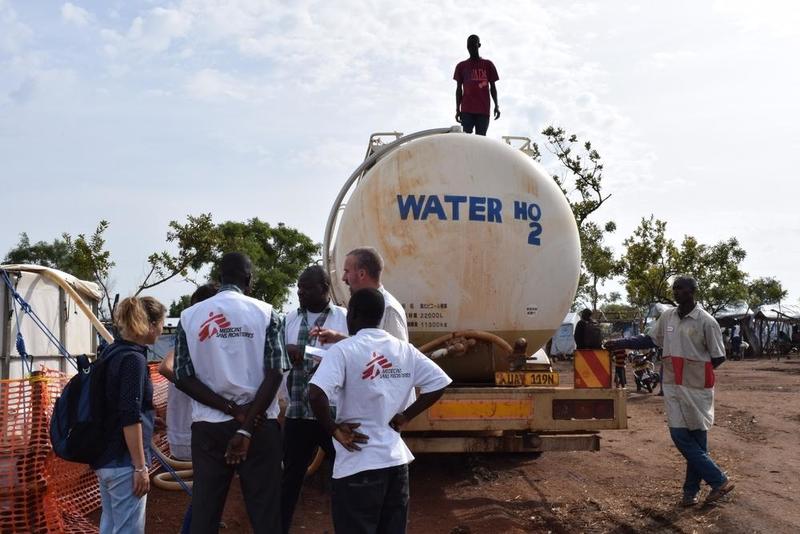
“Rampant killing” in South Sudan
On 8 July violence broke out in South Sudan’s capital, Juba. Around a month later the situation in the city was calm, although still tense. The conflict had sparked outbreaks of violence in surrounding counties.
Patients in our outpatient clinic in Bidi Bidi reported horrifying accounts of violence as recently as two or three weeks ago.
"We were working in the field when we heard gunshots," says Bista in Greater Equatoria Region, who arrived in Uganda just over a month ago. "I ran away from the town into the bush. As I was running a bullet caught my little finger and crushed it. It was bleeding a lot so I used herbs from the bush to bind it.
"One day [around a month later] me and my neighbour sneaked back to the village to try and get food.
"Armed men spotted my neighbour. They attacked and raped her. She shouted and made a lot of noise which gave me time to know what was happening, and I lay on the ground and crawled back to the bush.
"That was the last time I saw my home.”
Other people say they’ve seen family members, neighbours or friends shot in front of them, whilst others report their husbands disappeared from work, likely abducted by armed men.
Many talk about not having time to collect their belongings, or even wait for family members to return home before fleeing - setting off on foot towards the safety of Uganda. Some walked for up to nine days, hiding from armed men in the bush on the way.
Patient story: mary
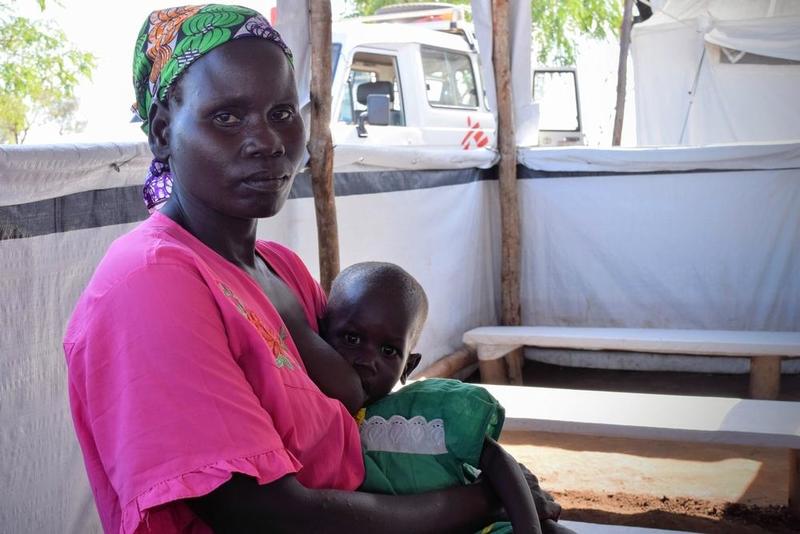
Mary, 37, from Greater Equatoria Region in South Sudan
Mary Modo is waiting at the MSF outpatient clinic to find out whether her two-year-old daughter, Pita, needs to be transferred to a nearby hospital.
Pita has had diarrhoea for several days, and finds it hard to urinate. Our clinicians think her urinary tract is blocked.
“The care I have received here in Uganda is helping me forget about the terrible situation in South Sudan," says Mary. "MSF have given us free healthcare. I hope they can do something for Pita.”
“I’d gone to the market [around five weeks ago] to buy some things and sell vegetables I’d been growing. Suddenly, these men turned up and started setting everything on fire. They were stealing from stalls and attacking people.
"I ran back to my farm as fast as I could. But when I arrived, I found that all of the farm, and my house, had been burnt down. There was nothing left, so I took my four children, and my mother in law, and we ran in to the bush.
“We began walking from there. It was a very long way and my children are too young to walk that distance. I carried two of them and my mother in law carried the third. My son had to walk, but his legs got very swollen.
“When we arrived at the reception centre in Uganda there were a lot of people. The authorities welcomed and registered us and they gave my children some biscuits.
"However, there are long queues and it’s very chaotic. I have to wait for a very long time. It’s particularly difficult because I have my children with me, they’re always getting pushed out the way, and so I lose my place.
"Additionally, the tent we were given is leaking, which makes life for us very tedious."

An overwhelmed Uganda
Those that do survive the perilous journey, arriving in the safety of Uganda, are met by buses and driven to reception centres where they’re registered.
They are given a plot of land, blankets, a mosquito net, tools to build a house, kitchen utensils, food rations and jerry cans for collecting water.
Compared to the welcome many refugees receive when they arrive in other countries, this is a fairly warm reception. However, the huge and sudden influx of people in to Uganda has been difficult for authorities to manage and conditions in the camp aren’t good.
“The conditions in the camp at first were appalling," says Enosh, a nurse and supervisor of our outpatient clinic in Bidi Bidi refugee camp. "It was really difficult seeing people suffer.
"They’d left their life behind in South Sudan and on top of that they were getting ill from diseases like cholera.”[[Article-CTA]]
Many struggle to build a shelter for themselves and clear their plot of land. Food distribution has been chaotic and there are long queues next to water tanks as people wait for water trucks to arrive.
The poor conditions and lack of access to clean drinking water have contributed to the spread of illnesses like malaria, respiratory tract infections, skin infections, diarrhoea and dysentery. We have also seen a few cases of cholera.
“Every day around 60 percent of patients we see have malaria," says Enosh. "There are many mosquitos. People are given a plot of land in the bush, but often have nowhere to hang a mosquito net.
"We can treat people with malaria at the clinic, but we’re also looking at whether we can spray areas to destroy mosquitoes' breeding grounds."
The outpatient clinic sees between 70 and 200 people every day.
We are also looking at how to bring a permanent supply of drinking water to around 40,000 of the people living in ‘Zone 2’ of the camp, by equipping the area with water pumps and pipes.
STAFF STORY: muhammed

Muhammed, 36, clinician at MSF's outpatient clinic in Bidi Bidi refugee camp, northern Uganda
"I arrived in Bidi Bidi refugee camp around five weeks ago. Back then the land was just bush: no roads, nothing.
"The government and UNHCR were starting to bring a huge influx of refugees from South Sudan here. They were also starting to open up roads, allocate plots of land to refugees and let NGOs like us work here.
"My five colleagues and I were tasked with getting the MSF clinic up and running. Now I work as a clinician for the site.
"The most common illness we have here is malaria. But there are also upper respiratory tract infections, diarrhoea and skin infections. It’s mainly diseases that are linked to living conditions in the camp and the lack of safe drinking water.
"Most of our patients tell me they left South Sudan because they feared for their lives.
"There are around 40,000 people in this one section of the camp where our clinic is, and it’s already full just weeks after opening. Thousands more people are arriving in Uganda every day."
"There are tribal clashes and violence from opposing sides. People are scared they could be attacked at any time.
"Someone told me that he returned from work one day to find his town was deserted. He didn’t see a single person. He went up to his house and there was no one there.
"Perhaps people had fled due to violence or it had been evacuated, he doesn’t know but it was frightening. He tried to call his wife and his wife’s family but he couldn’t get through.
"He decided to flee to Uganda and tried to contact them for a week from here with no luck. So he went back to Juba on foot but he still couldn’t find them.
"In the end he decided to come back to Uganda, and he’s still here now, but he doesn’t know where his family are.
"That’s just one person’s experience, but there are so many more. There are around 40,000 people in this one section of the camp where our clinic is, and it’s already full just weeks after opening. Thousands more people are arriving in Uganda every day.
"At least people are saying it is safe here. They’re relieved they made it here. They don’t want to go back to South Sudan and there’s a hope they can start to rebuild their lives here from scratch.
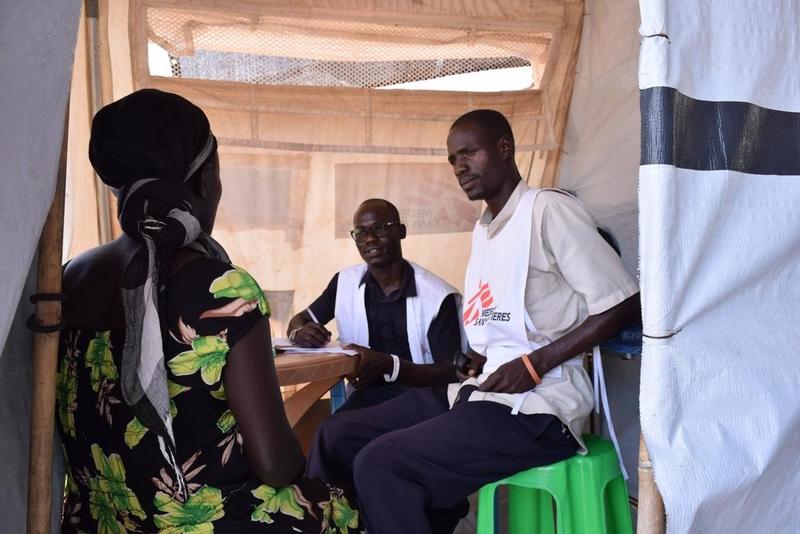
Peace at last
As the site continues to grow and thousands more people flood across the border every day, we will continue to monitor people’s health, nutrition and sanitation needs.
For now, whilst it’s clear that conditions in the camp need improvement and people have clearly been through hugely traumatic events, they are also often relieved to have found peace.
They are in a place where there are no gunshots and can start to rebuild their lives, albeit from scratch.
Patient Mary Modo says: “Compared to South Sudan life is pretty good here. Everyone is dying in South Sudan, homes are being burnt, and life is only stressful.
"Here in Uganda it’s not easy, but I’m managing. The main problem has been getting enough food. But at least I’m here, in a peaceful place and at least now MSF are here so I can get all the medication my family needs."



